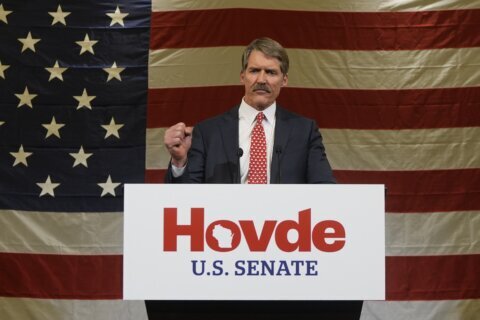Missouri voters have once again passed a constitutional amendment requiring Kansas City to spend at least a quarter of its budget on police, up from 20% previously.
Tuesday’s vote highlights tension between Republicans in power statewide who are concerned about the possibility of police funding being slashed and leaders of the roughly 28% Black city who say it should be up to them how to spend local tax dollars.
“In Missouri, we defend our police,” Republican state Sen. Tony Luetkemeyer posted on the social platform X on Tuesday. “We don’t defund them.”
Kansas City leaders have vehemently denied any intention of ending the police department.
Kansas City is the only city in Missouri — and one of the largest in the U.S. — that does not have local control of its police department. Instead, a state board oversees the department’s operations, including its budget.
“We consider this to be a major local control issue,” said Gwen Grant, president of the Urban League of Greater Kansas City. “We do not have control of our police department, but we are required to fund it.”
In a statement Wednesday, Mayor Quinton Lucas hinted at a possible rival amendment being introduced “that stands for local control in all of our communities.”
Missouri voters initially approved the increase in Kansas City police funding in 2022, but the state Supreme Court made the rare decision to strike it down over concerns about the cost estimates and ordered it to go before voters again this year.
Voters approved the 2022 measure by 63%. This year, it passed by about 51%.
Fights over control of local police date back more than a century in Missouri.
In 1861, during the Civil War, Confederacy supporter and then-Gov. Claiborne Fox Jackson persuaded the Legislature to pass a law giving the state control over the police department in St. Louis. That statute remained in place until 2013, when voters approved a constitutional amendment returning police to local control.
The state first took over Kansas City police from 1874 until 1932, when the state Supreme Court ruled that the appointed board’s control of the department was unconstitutional.
The state regained control in 1939 at the urging of another segregationist governor, Lloyd Crow Stark, in part because of corruption under highly influential political organizer Tom Pendergast. In 1943, a new law limited the amount a city could be required to appropriate for police to 20% of its general revenue in any fiscal year.
“There are things like this probably in all of our cities and states,” said Lora McDonald, executive director of the Metro Organization for Racial and Economic Equity, or MORE2. “It behooves all of us in this United States to continue to weed out wherever we see that kind of racism in law.”
The latest power struggle over police control started in 2021, when Lucas and other Kansas City leaders unsuccessfully sought to divert a portion of the department’s budget to social service and crime prevention programs. GOP lawmakers in Jefferson City said the effort was a move to “defund” the police in a city with a high rate of violent crime.
Copyright © 2024 The Associated Press. All rights reserved. This material may not be published, broadcast, written or redistributed.







